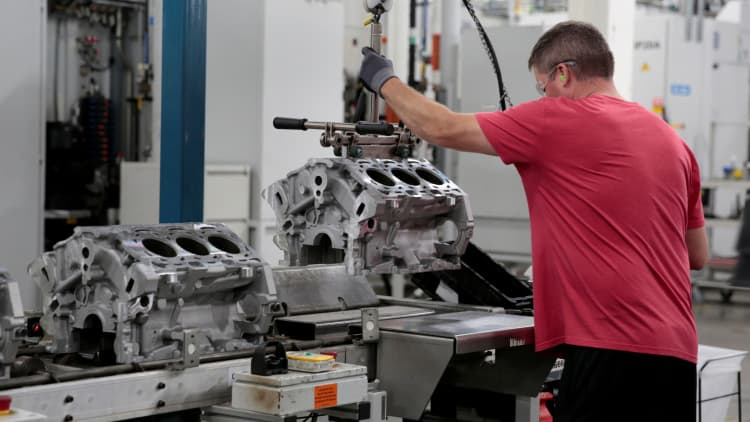Biden climate act may create your next job, and a half-million
A worker at First Solar in Perrysburg, Ohio July 8, 2022.
Megan Jelinger | Reuters
Caton Fenz already thought that 2022 was going to be a good year. The 44-year-old CEO of Houston-based ConnectGen, which builds wind and solar power plants that sell electricity to utilities, had planned to hire about five or six new workers.
Then Congress passed the Inflation Reduction Act last month, and Fenz’s four-year-old company is now looking for a dozen employees.
“That’s 25% growth,” said Fenz. “You see all these charts of pre-IRA power installations, and post-IRA the projections go from medium to massive. And to do it, you need people.”
Consider Fenz’s hiring dilemma a down payment on the jobs likely to flow from the new law, which set aside more than $400 billion over 10 years, mostly in tax credits, to promote and accelerate the spread of clean energy and vehicles.
Since the bill passed, companies like Honda and Toyota have announced that they will build battery plants to power electric vehicles in Ohio and North Carolina. First Solar has announced a $1.2 billion plant for solar panels at an undetermined location.
Clean energy advocates like John Hensley, research vice president at trade association American Clean Power, say the bill will help spark a tripling in renewable electricity capacity by 2030.
By the end of the decade, it expects to see one million people employed in clean energy development. “There will be the establishment of an entire supply chain that will build upon industries that are already well established,” Hensley said.
Overall, ACP expects 550,000 new jobs in the clean electricity sector from the law, more than doubling the 442,000 that cleantech companies employ now. The industry will spend as much as $600 billion by 2030 to triple the nation’s capacity for wind and solar power, according to the group’s projections. That doesn’t count many thousands more from electric vehicle and battery plants, though experts say some of those gains will offset losses at companies making parts for gasoline-powered cars that EVs won’t need.
General Motors has announced three coming plants to build battery cells for electric vehicles and expects to announce a fourth soon, said GM spokesman Matthew Ybarra. The first three plants will create 5,100 jobs, mostly in quality, safety and production. Ford has announced 17,000 new production jobs for EVs in the last year, though its plans preceded changes in the law, spokeswoman Catherine Hargett said. Toyota’s plant is expected to add 2,100.

For all of that, Tesla and Elon Musk may be the biggest beneficiaries of a law whose proponents are increasingly estranged from Musk. Wolfe Research analyst Rod Lache said on Sept. 6 that Tesla stock might surge 30% as the impact of the law is felt. Though many Teslas are too expensive to qualify for consumer tax credits under the new law, Tesla will get breaks at the corporate level because it controls much of its own battery production, Lache said.
“We expect…
Read More: Biden climate act may create your next job, and a half-million
